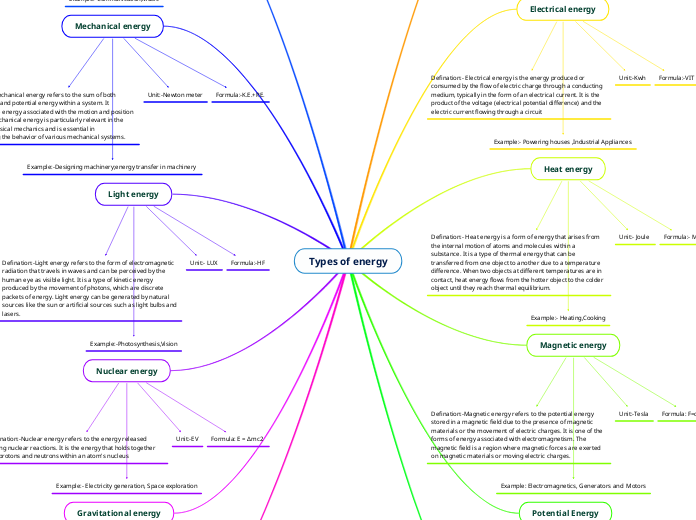Types of energy
Chemical energy:-
Defination:-Chemical energy is a form of potential energy that is stored in the chemical bonds of molecules. When chemical reactions occur, these bonds are broken or formed, releasing or absorbing energy. Chemical energy is one of the most common and important forms of energy in our everyday lives and plays a crucial role in various natural and industrial processes.
Unit:-Joule
Formula: E = w + q
Examples:- Fossil fuels,Metabolism
Electrical energy
Defination:- Electrical energy is the energy produced or consumed by the flow of electric charge through a conducting medium, typically in the form of an electrical current. It is the product of the voltage (electrical potential difference) and the electric current flowing through a circuit
Unit:-Kwh
Formula:-VIT
Example:- Powering houses ,Industrial Appliances
Heat energy
Defination:- Heat energy is a form of energy that arises from the internal motion of atoms and molecules within a substance. It is a type of thermal energy that can be transferred from one object to another due to a temperature difference. When two objects at different temperatures are in contact, heat energy flows from the hotter object to the colder object until they reach thermal equilibrium.
Unit:- Joule
Formula:- MCT
Example:- Heating,Cooking
Magnetic energy
Defination:-Magnetic energy refers to the potential energy stored in a magnetic field due to the presence of magnetic materials or the movement of electric charges. It is one of the forms of energy associated with electromagnetism. The magnetic field is a region where magnetic forces are exerted on magnetic materials or moving electric charges.
Unit:-Tesla
Formula: F=q(V x B)
Example: Electromagnetics, Generators and Motors
Potential Energy
Definition:-Potential energy is a concept in physics that refers to the energy an object possesses due to its position or configuration relative to other objects. It is a scalar quantity and is usually measured in joules (J) in the International System of Units (SI). The potential energy of an object depends on factors such as its mass, its height above a reference point, and the force acting on it.
Unit:-Joule
Formula: mgh
Example:-Gravitational Astronomy, Energy storage
Kinetic Energy
Definition: Kinetic energy is the energy possessed by an object due to its motion. It is a scalar quantity and depends on both the mass and velocity of the object. When an object is in motion, it has the ability to do work and transfer energy to other objects upon collision or interaction.
Unit:-Joule
Formula: KE = ½mv2
Example:-Transportation, Sports recreation
Sound energy
Defination :-Sound energy refers to the form of energy produced when sound waves propagate through a medium, typically air. It is a type of mechanical energy, as it involves the movement of particles in the medium due to the compression and rarefaction of waves. Sound energy is a vital component of our daily lives, enabling us to communicate, perceive our surroundings, and enjoy music.
Unit:-Decible
Formula v = √(γ × P/ρ): -
Example:-Communication,Music
Mechanical energy
Defination:-Mechanical energy refers to the sum of both kinetic energy and potential energy within a system. It represents the energy associated with the motion and position of objects. Mechanical energy is particularly relevant in the context of classical mechanics and is essential in understanding the behavior of various mechanical systems.
Unit:-Newton meter
Formula:-K.E.+P.E.
Example:-Designing machinery;energy transfer in machinery
Light energy
Defination:-Light energy refers to the form of electromagnetic radiation that travels in waves and can be perceived by the human eye as visible light. It is a type of kinetic energy produced by the movement of photons, which are discrete packets of energy. Light energy can be generated by natural sources like the sun or artificial sources such as light bulbs and lasers.
Unit:- LUX
Formula:-HF
Example:-Photosynthesis,Vision
Nuclear energy
Defination:-Nuclear energy refers to the energy released during nuclear reactions. It is the energy that holds together the protons and neutrons within an atom's nucleus
Unit:-EV
Formula: E = Δmc2
Example:- Electricity generation, Space exploration
Gravitational energy
Definition: Gravitational energy, also known as gravitational potential energy, is the energy stored in an object due to its position in a gravitational field. It is the potential energy that an object possesses by virtue of its height above the reference level in a gravitational field.
Unit: N m 2 k g - 2
Formula:- Mgh
Example:-Hydropower Generation,Lifting and Lowering Loads
Law of conservation
Physics and Engineering Applications: The conservation of energy is a crucial principle in physics and engineering, guiding the analysis and understanding of various systems and phenomena.
Energy Conversion: The conservation of energy principle is fundamental in the design and operation of energy conversion systems. These systems are responsible for transforming one form of energy into another to meet various needs
